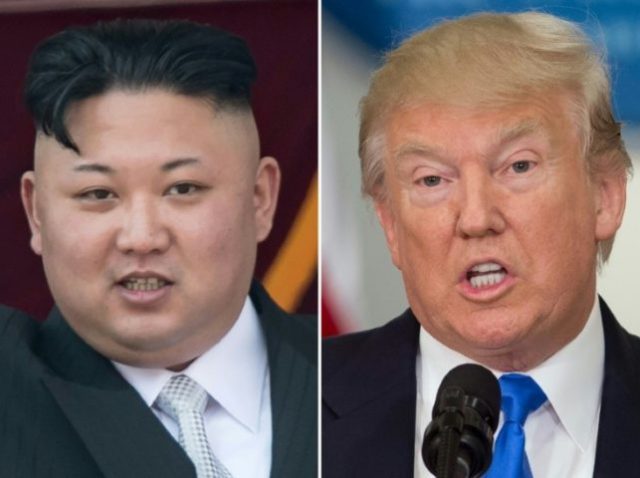The Chinese state outlet, Global Times, which typically takes an aggressive tone in covering the United States, declared on Wednesday that President Donald Trump and the U.S. policy on North Korea had “failed,” citing Pyongyang’s latest missile test.
At press time, the article is not available at its original Global Times link, though it remains accessible in Google’s cache history.
North Korea’s Korean Central News Agency (KCNA) announced late Tuesday that dictator Kim Jong-un had personally directed the launching of a new model of intercontinental ballistic missile (ICBM), named Hwasong-15, and that he declared the test a success.
China is North Korea’s largest trading partner, ensuring that the Kim regime continues to possess the funds necessary for its illegal weapons development. Beijing claims it has abided by international sanctions and that American aggression against North Korea is to blame for current tensions.
“It’s fair to say that US policy on North Korea has failed, and so has the policy of President Donald Trump,” the Times declared on Wednesday. Specifically, the Times complains that Trump “heightened the pressure on North Korea at the wrong time, intensifying the tensions on the peninsula almost to the utmost, leaving little space for diplomatic maneuvering.”
“Although the US has demanded an emergency meeting of the UN Security Council, the international community has actually run out of leverage against North Korea. Pyongyang has gained tremendous confidence this time, so the Security Council’s condemnation and possible fresh sanctions are no big deal.”
The article notes that North Korea appears to have “complete disregard for US pressure and intimidation,” which makes any threats from the United States of further sanctions less effective.
The Chinese state newspaper concludes that neither the United States nor North Korea means any of their “bellicose posturing” and that both are “a paper tiger.”
The Global Times struck a significantly more abrasive tone towards the United States than the Chinese government proper, though the latter controls the former. Chinese leader Xi Jinping spoke to President Donald Trump on the phone on Wednesday to discuss North Korea’s missile test, reportedly urging Trump to maintain close ties with China to resolve the situation.
Xi told Trump, “China would like to keep up communications with the United States and all other related parties, and jointly push the nuclear issue towards the direction of peaceful settlement via dialogues and negotiation,” according to state news outlet Xinhua.
It added:
Xi called on the two sides to carry out these consensuses, make good plans for high-level bilateral exchanges, as well as at other levels, ensure the second-round talks under all four high-level China-U.S. dialogue mechanisms a success, and implement cooperation agreements and projects between the two countries.
Xinhua claimed that Trump told Xi, “Washington highly values China’s important role in solving the nuclear issue, and is willing to enhance communications and coordinations with China in search for solutions to the issue.”
The White House readout of the call stated that Trump “emphasized the need for China to use all available levers to convince North Korea to end its provocations and return to the path of denuclearization,” language that indicates more pressure on Xi than the Xinhua version of the call.
Trump issued his version of what occurred on the call on Twitter, where he assured the public, “The situation will be handled!”:
Just spoke to President XI JINPING of China concerning the provocative actions of North Korea. Additional major sanctions will be imposed on North Korea today. This situation will be handled!
— Donald J. Trump (@realDonaldTrump) November 29, 2017
The Chinese Foreign Ministry also responded to the missile launch Wednesday by urging North Korea to cease violating international law.
Spokesman Geng Shuang told reporters:
China strongly urges the DPRK side to abide by relevant Security Council resolutions and cease actions that will heighten tensions on the Korean Peninsula. We hope that all relevant parties will act cautiously and work together to safeguard peace and stability in the region.
The United States recently increased pressure on China, as North Korea’s largest and most important ally, to deter Kim from further provocations by sanctioning four Chinese companies and a Chinese national accused of doing business with the regime. All the companies mentioned operate out of Dandong, a Chinese city on the North Korean border where many do business with the other side.
China has kept its ties to North Korea, sending an envoy to Pyongyang this month to inform Kim on the updates to the Chinese Communist Party (CPC) Constitution approved during its last Congress in October. Spokesman Geng told reporters, asking about the results of that visit on Wednesday, that “the two sides exchanged views on the relations between the two parties and countries as well as other issues of mutual concern” but provided no further details.
China has repeatedly urged what it calls a “dual-track approach” to resolving the North Korea crisis, which would require the United States to withdraw entirely from Asia, and then, hopefully, North Korea would end its nuclear program. The “dual-track approach” would also greatly benefit China, whose officials routinely protest that a U.S. presence in the area makes their plans to dominate the South China Sea and much of the Asian continent by asserting military and economic control.

COMMENTS
Please let us know if you're having issues with commenting.